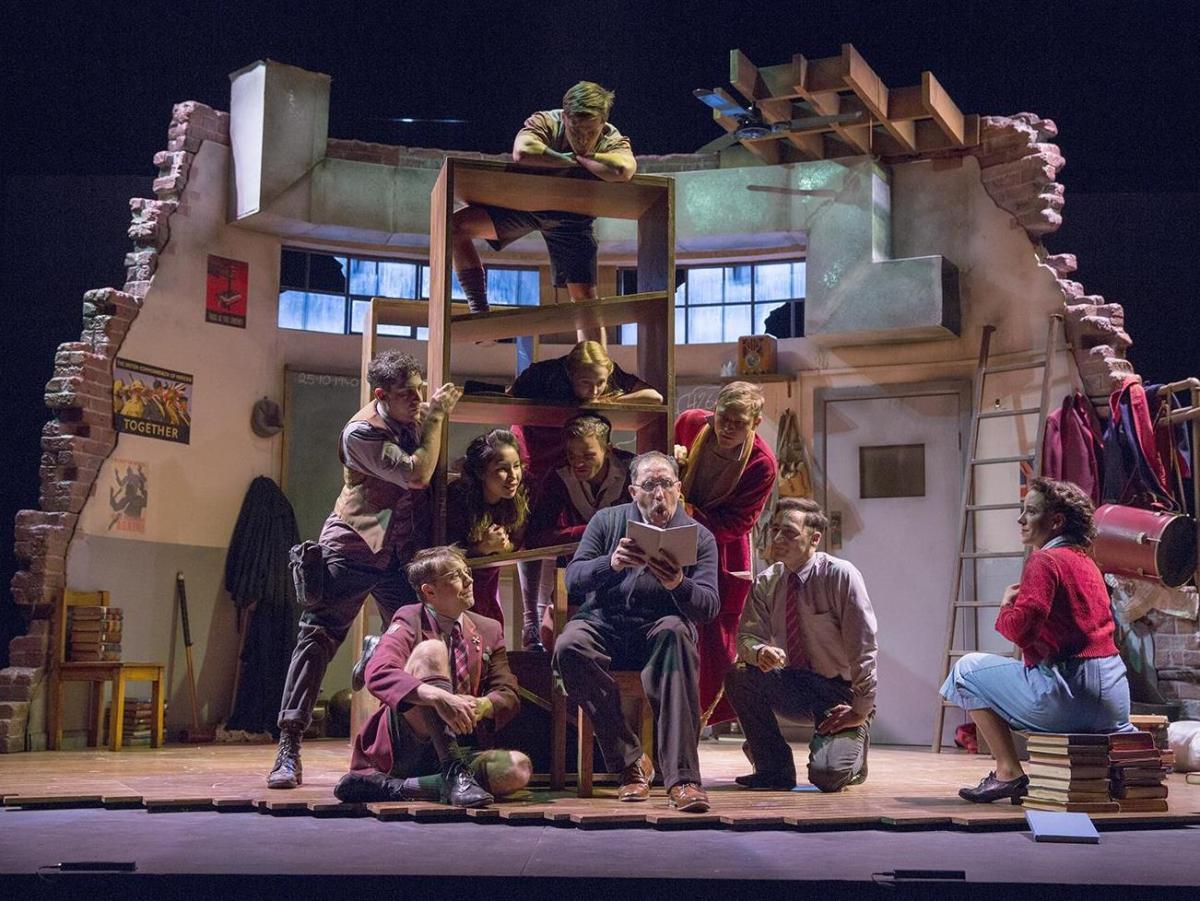Image by Michele Mossop.
Bell Shakespeare’s production of Henry V uses a well-crafted conceit to explore war and youth, with director Damian Ryan blurring the lines between drama and reality.
Ryan’s vision for Henry V is a clever one. Shakespeare’s script about the young king who conquered France is transformed into a ‘play within a play’ (The Bard would have been thrilled!) with the audience watching a play in which a group of university students perform Henry V for their own entertainment. The students (seemingly at Cambridge or similar) are stuck in a bunker during World War II, their confined camaraderie frequently punctured by the sounds of bombs and battles. Their professor (wonderfully performed by Keith Agius) gathers them together with a line cleverly borrowed from Richard II, saying, ‘Let us sit upon the ground/ And tell sad stories about the death of kings.’
The young performers are convincing as a group of students performing a play – early on, their speech is occasionally halting, with amusing mispronunciations thrown in for comic effect. As the play progresses, the students begin to use the text to work through their own emotions and define their feelings about the war raging outside their window.
It’s the sort of idea that sounds odd on paper, but it works well on stage – and in some cases, feels like genuine genius. A particularly good example is the death of Falstaff, a role that had been assumed in the schoolroom play by the teacher. Falstaff’s death happens in the second act of Henry V, and often feels awkward in modern productions. It has decent emotional weight when considered in the content of Shakespeare’s tetralogy, where the character is made familiar to audiences in the preceding Henry IV plays, but when Henry V is performed without this context, it seems odd to spend so much time grieving a barely-seen character. Ryan addresses this by conflating Falstaff’s death with that of the professor, which leads to the students using the eulogy text to work through their own devastation.
The result is that this Henry V is much more emotionally resonant than most modern productions. The play’s enduring value has relied heavily on its big, inspiring speeches, but in truth, it’s not always very relatable (a young king wants to conquer France and everyone adores him because… he’s fairly nice?) Shakespeare’s text is intermingled with its performers’ own anger, fear and hope, and the result is really quite special.
There are occasional parts that fall flat. Granted, few productions have ever managed to make the late ‘courtship’ scene between Henry and Katherine of France work – after all, it’s essentially a man badgering a woman into marrying him and then extracting a not-quite-consensual kiss from her on the grounds of ‘Is King’. Ryan has his actors play the scene fairly straight, rather than looking for a twist. The result is a bit jarring (although to be fair, so is the scene).
Overall, however, this is a very strong production of an important but sometimes unwieldy play. It showcases the varied talents of its cast while compelling and charming its audience.
Rating: 4 out of 5 starsHenry V
By William Shakespeare
Produced by Bell Shakespeare
Directed by Damien Ryan
Designer: Anna Gardiner
Lighting Designer: Sian James-Holland
Composer & Sound Designer: Steve Francis
Vocals Composer: Drew Livingston
Movement & Fight Director: Scott Witt
Dialect & Voice Coach: Jess Chambers
Assistant Director: Susanna Dowling
Cast: Michael Sheasby, Matthew Backer, Drew Livingston, Damien Strouthos, Gabriel Fancourt, Eloise Winestock, Danielle King, Darcy Brown, Keith Agius, Ildiko Susany
Arts Centre Melbourne, St Kilda Rd
www.artscentremelbourne.com.au
1 – 12 July





